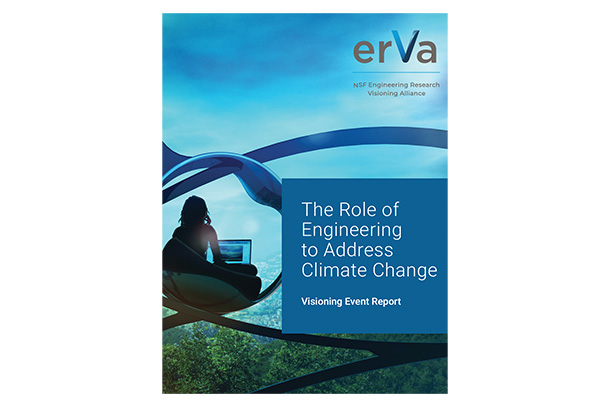
Two Penn State researchers provided key leadership in the creation of a National Science Foundation report on engineering research areas that need to be better developed to address climate change. Credit: Adobe Stock. All Rights Reserved.
IEE leadership helps shape report to NSF on climate change, role of engineering
September 13, 2022
Editor’s note: This article originally appeared on Penn State News. Bruce Logan, Evan Pugh University Professor, Kappe Professor of Environmental Engineering and director of the Institutes of Energy and the Environment, was featured.
UNIVERSITY PARK, Pa. — Two Penn State researchers provided key leadership in the creation of a report to the National Science Foundation (NSF) on engineering research areas that need to be better developed to address climate change. Bruce Logan, Evan Pugh University Professor, Kappe Professor of Environmental Engineering and director of the Institutes of Energy and the Environment (IEE) at Penn State, was a co-chair and member of the report’s Thematic Task Force. He also guided content creation and report editing. Erica Smithwick, Penn State Distinguished Professor of Geography and associate director of IEE, provided the group with her expertise on carbon sequestration.
More than 100 experts from academia, industry and government participated in the report, titled “The Role of Engineering to Address Climate Change.” It was produced by the Engineering Research Visioning Alliance (ERVA), an NSF-funded group that seeks to identify ways in which engineering can be impactful and support the needs of the United States.

Bruce Logan provided key leadership that informed The Role of Engineering to Address Climate Change: A Visioning Report. Credit: Engineering Research Visioning Alliance. All Rights Reserved.
In January 2021, the White House published a memo that stated, “The United States and the world face a profound climate crisis with a narrow moment to pursue action to avoid the most catastrophic impacts and to seize the opportunities that tackling climate change presents.”
ERVA responded with a visioning event on topics such as greenhouse gas capture, resilient infrastructure, climate justice, renewable energy and energy storage. It culminated in “The Role of Engineering to Address Climate Change” report.
“There are already things that we know that we need to do to address climate change,” Logan said. “But going forward we need to establish the critical research needs in engineering to more effectively develop solutions to climate change. The critical topics for research by engineers will likely be different from those of social scientists, atmospheric scientists, energy storage scientists, for example, although everyone will need to work together to implement these solutions.”
Ultimately, the technologies and infrastructure developments needed for a future that is not burning fossil fuels, as well as addressing other greenhouse gases, will need to be nearly completely re-engineered, said Logan, Evan Pugh University Professor and Kappe Professor of Environmental Engineering.
“Science can provide the fundamentals for enabling these changes, but engineers are needed to make it happen,” he said.
Smithwick said addressing complex energy and environmental issues requires that all knowledge domains are at the table.
“Engineering's role is critical to help us translate scientific discoveries into sustainable solutions for the built environment,” Smithwick said. “Our NSF LandscapeU Graduate Traineeship program purposely includes integration of engineering and the arts to complement social and natural sciences because landscape design must include solutions in the physical and material world.”
Smithwick said engineering can help innovate solutions that meet societal needs around climate change, energy transitions and sustainability.
“When integrated with other social, cultural and biophysical perspectives, engineering can identify pathways that help us reimagine new worlds in which we live and work sustainably,” she said. “As part of interdisciplinary teams, engineers translate knowledge into solutions for the built environment.”



